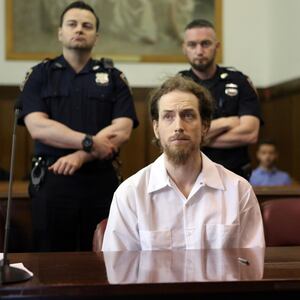Thomas Gilbert Jr., the adult son of a successful New York City hedge-fund manager, has been found guilty of the 2015 murder of his father after an alleged dispute over his weekly allowance.
The New York jury reportedly found him guilty of three out of four charges, including “second-degree murder and weapon possession charges.”
Gilbert’s five-week trial had been delayed in the years since the murder in order to determine whether or not he was mentally fit to stand trial.
After undergoing four mental evaluations, one of which came back inconclusive, Gilbert, now 34, was eventually deemed fit to stand trial. He declined to appear in person for much of the trial, but was present for closing arguments on Wednesday.
According to the New York Post, he faces up to life in prison and is set to be sentenced on Aug. 9.
On January 4, 2015, Thomas Gilbert Jr. unexpectedly arrived at his parents' posh apartment in Manhattan’s Turtle Bay neighborhood, just hours after his father had told him that he was slashing his weekly allowance to $300.
He told his mother, Shelley Gilbert, that he needed “to talk business” with his dad, Thomas Gilbert Sr., a founding managing partner at Wainscott Capital, a lucrative New York hedge fund.
He then sent his mother out of the apartment to fetch him a sandwich and a Coke. Gilbert allegedly knew his mom didn’t keep the soda in the apartment, so she would have to go out to get it—leaving him alone with his dad.
When his mother returned, she found the elder Gilbert shot in the head with a gun on his chest. His left hand was on the handle, “as if someone wanted it to appear it was suicide,” Craig Ortner, an assistant district attorney with the Manhattan District Attorney’s Office, said during the trial.
Surveillance video shows the younger Gilbert, wearing a hoodie and carrying a gym bag, enter and leave his parent’s apartment building within a 15-minute span.
After Shelley Gilbert discovered her husband shot in their apartment, and her son nowhere to be found, she called 911.
“My husband is, I think, dead,” she told the operator, audibly distraught.
When the operator asked her who had shot her husband, Gilbert responded: “My son—who is nuts. But I didn’t know he was this nuts,” she said. “I had no idea he was this nuts.”
Gilbert Jr.’s former therapist, Susan Evans, who saw him for several years before the shooting, testified during the trial that he suffered from paranoid thoughts that were “interfering” with his ability to function. In the months before the incident, Evans recommended that he be screened for paranoid schizophrenia. Other former doctors testified that they prescribed him antipsychotic medication, but Evans said that Tommy did not take the medications regularly.
Prosecutors argued that while he may have had issues, none of the doctors who had treated Tommy over the years had ever recommended anything in addition to therapy and medication.
The jury was tasked with deciding whether Gilbert was unable to distinguish right from wrong at the time he shot and killed his father, a fact that was not disputed by the defense.
Before his father’s murder, Gilbert Jr. lived a comfortable life by any measure. He attended prep school in Manhattan, boarding school in Massachusetts, and graduated as a legacy from Princeton University.
His psychological problems allegedly began after he graduated from college. According to Ortner, Gilbert spent most of his post-grad life in the Hamptons, “surfing, playing tennis, working out, and partying.” His parents paid the rent at his apartment in Manhattan’s expensive Chelsea neighborhood, took care of his car payments, auto insurance, and “even paid his parking tickets for him.” All on top of a whopping $1,000 per week allowance.
In an attempt to make his son financially independent, the elder Gilbert began reducing his son’s weekly allowance in 2014. Around that same time, according to prosecutors, Gilbert Jr.’s computer history shows he began searching online for a hit man.
The deposits first shrunk from $1,000 to $800, then to $600. Hours before he was killed, Gilbert Sr. cut his son’s allowance down to $300.









